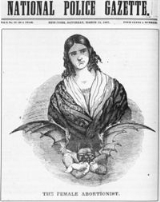
Police Gazette
Encyclopedia
The National Police Gazette, commonly referred to as simply the Police Gazette, was an American magazine founded in 1845 by two journalists, Enoch E. Camp, also an attorney, and George Wilkes
, a transcontinental railroad
booster. The editor and proprietor from 1877 until his death in 1922 was Richard Kyle Fox, an immigrant from Ireland
.
Ostensibly devoted to matters of interest to the police
, it is a tabloid-like publication, with lurid coverage of murder
s, Wild West outlaws, and sport
. It is well known for its engravings and photographs of scantily clad strippers
, burlesque
dancers, and prostitutes, often skirting on the edge of what is legally considered obscenity
.
The National Police Gazette enjoyed considerable popularity in the late 19th century and early decades of the 20th century; but its popularity decreased during the Great Depression
.
The National Police Gazette continued on after the death of Fox as a monthly publication for many years before ceasing print publication in 1977.
in its heyday it was immensely influential. In the first part of the 20th century, the United States became the centre for professional boxing. It was generally accepted that the "world champions" were those listed by the Police Gazette
. After 1920, the National Boxing Association (N.B.A.) began to sanction "title fights".
' after the editor of the gazette, Richard K. Fox. Despite crossing the Atlantic in 55 days (a record which has never been broken) the Police Gazette never paid the men the promised prize money.
George Wilkes
-Early life:Wilkes was born in 1817 in New York state in the United States. His parents may have been George Wilkes, a cabinet maker, and Helen, although this is not certain. The younger Wilkes became a law clerk for Enoch E. Camp, but left the legal profession for journalism...
, a transcontinental railroad
Transcontinental railroad
A transcontinental railroad is a contiguous network of railroad trackage that crosses a continental land mass with terminals at different oceans or continental borders. Such networks can be via the tracks of either a single railroad, or over those owned or controlled by multiple railway companies...
booster. The editor and proprietor from 1877 until his death in 1922 was Richard Kyle Fox, an immigrant from Ireland
Ireland
Ireland is an island to the northwest of continental Europe. It is the third-largest island in Europe and the twentieth-largest island on Earth...
.
Ostensibly devoted to matters of interest to the police
Police
The police is a personification of the state designated to put in practice the enforced law, protect property and reduce civil disorder in civilian matters. Their powers include the legitimized use of force...
, it is a tabloid-like publication, with lurid coverage of murder
Murder
Murder is the unlawful killing, with malice aforethought, of another human being, and generally this state of mind distinguishes murder from other forms of unlawful homicide...
s, Wild West outlaws, and sport
Sport
A Sport is all forms of physical activity which, through casual or organised participation, aim to use, maintain or improve physical fitness and provide entertainment to participants. Sport may be competitive, where a winner or winners can be identified by objective means, and may require a degree...
. It is well known for its engravings and photographs of scantily clad strippers
Striptease
A striptease is an erotic or exotic dance in which the performer gradually undresses, either partly or completely, in a seductive and sexually suggestive manner...
, burlesque
American burlesque
American Burlesque is a genre of variety show. Derived from elements of Victorian burlesque, music hall and minstrel shows, burlesque shows in America became popular in the 1860s and evolved to feature ribald comedy and female striptease...
dancers, and prostitutes, often skirting on the edge of what is legally considered obscenity
Obscenity
An obscenity is any statement or act which strongly offends the prevalent morality of the time, is a profanity, or is otherwise taboo, indecent, abhorrent, or disgusting, or is especially inauspicious...
.
The National Police Gazette enjoyed considerable popularity in the late 19th century and early decades of the 20th century; but its popularity decreased during the Great Depression
Great Depression
The Great Depression was a severe worldwide economic depression in the decade preceding World War II. The timing of the Great Depression varied across nations, but in most countries it started in about 1929 and lasted until the late 1930s or early 1940s...
.
The National Police Gazette continued on after the death of Fox as a monthly publication for many years before ceasing print publication in 1977.
in its heyday it was immensely influential. In the first part of the 20th century, the United States became the centre for professional boxing. It was generally accepted that the "world champions" were those listed by the Police Gazette
Police Gazette
The National Police Gazette, commonly referred to as simply the Police Gazette, was an American magazine founded in 1845 by two journalists, Enoch E. Camp, also an attorney, and George Wilkes, a transcontinental railroad booster...
. After 1920, the National Boxing Association (N.B.A.) began to sanction "title fights".
Frank Samuelsen and George Harbo
In 1896, the Police Gazette also offered, a prize of $10,000 to the first to row across the Atlantic Ocean. In the same year George Harbo and Frank Samuelsen invested their savings in a 18 foot rowboat, which they named 'FoxFOX surf boat
The Fox was a specially built surf boat to be rowed across the Atlantic Ocean. It was custom built in 1896 by Seaman Sea Skiffs of Branch Port, New Jersey by William A...
' after the editor of the gazette, Richard K. Fox. Despite crossing the Atlantic in 55 days (a record which has never been broken) the Police Gazette never paid the men the promised prize money.
External links
- National Police Gazette site, a homage to the Police Gazette's style in coverage of current events and contains some archival materials from the original publication.

